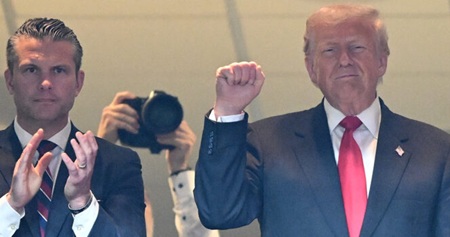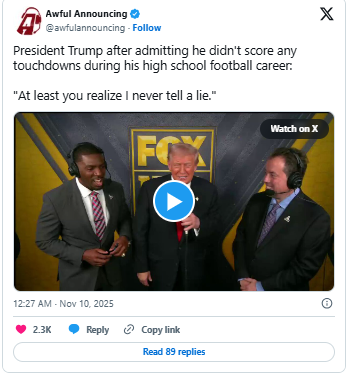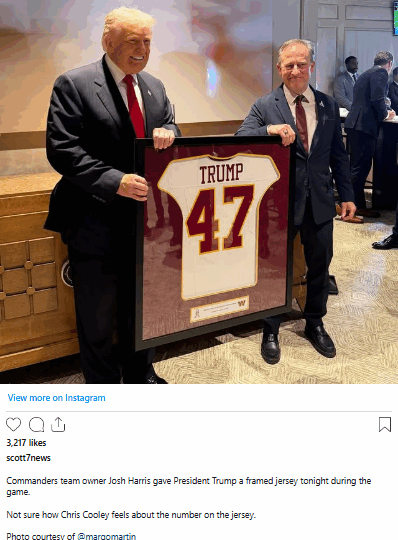
Donald Trump made a high-profile appearance at an NFL game that quickly captured national attention, arriving nearly 80 minutes after the scheduled kickoff.
As he entered the stadium, cameras followed him into a luxury suite alongside House Speaker Mike Johnson and Defense Secretary Pete Hegseth.
The reception from the crowd was mixed: some fans cheered, while others booed, reflecting the polarized views surrounding the former president.
This event was particularly historic because it marked the first time in nearly fifty years that a sitting U.S. president had attended a regular-season NFL game.
News outlets, sports analysts, and social media users rapidly discussed and dissected his arrival, signaling the ongoing fascination and scrutiny that surrounds Trump’s public appearances.
Once Trump joined the FOX Sports broadcast booth during the third quarter, the focus shifted from the stadium crowd to his interactions on live television.
Sitting between play-by-play announcer Kenny Albert and analyst Jonathan Vilma, Trump was asked a series of lighthearted questions about his football days at the New York Military Academy.
FOX aired a vintage photograph of Trump posing with his academy football team, which prompted Vilma to jokingly ask, “So we were trying to look up your stats. How many touchdowns did you have back then? Six? Seven?”
Trump’s response was notably modest for someone who frequently emphasizes his personal accomplishments and competitive success. “I’m not sure I had any,” he admitted. “It was a long time ago… At least you realize that I never tell a lie, right?”
The remark immediately went viral across social media platforms, with many viewers unsure whether he was being sarcastic or serious.

Given Trump’s long history of making statements fact-checkers have disputed, the comment drew particular attention.
For context, during a joint address to Congress earlier that year, NBC reported that Trump had made at least twelve claims that were false or misleading, further intensifying scrutiny of his statement in the broadcast booth.
In addition to reflecting on his football past, Trump took the opportunity to comment on politics, criticize President Biden, and even provide on-air commentary on the game itself.
At one point, he called a play, saying, “I think this is a very important couple of plays. Second and seven, let’s see what happens. Well, that’s alright. Not bad. Good runner.” He added later, “This is a very big play, don’t you think?
They have to get a touchdown, let’s put it differently, they just have to get a touchdown.”
Trump’s mixture of political commentary and amateur sports analysis was met with a combination of amusement, curiosity, and skepticism by viewers, illustrating his unusual ability to blend multiple public roles in a single event.
Despite the occasional awkwardness, Trump also spoke about the broader significance of football. “I just love it,” he said. “It’s a microcosm of life — the good, the bad, and the ugly.
You have the triumphs, you have the problems, but you can never quit. You can never give up.”
These remarks emphasized themes of perseverance and determination, which have long been central to Trump’s public messaging, whether in political campaigns or personal anecdotes.
Many commentators noted that, while the delivery was unpolished, the underlying message aligned with a broader narrative Trump often promotes about resilience and striving for success despite obstacles.
Trump’s relationship with the Commanders appeared particularly close during the game. He was presented with a framed Commanders jersey bearing his name and the number 47, a gift from team owner Josh Harris.

This gesture suggested an ongoing, supportive relationship between Trump and the organization, which has been embroiled in controversy in recent years, including debates over the team’s previous name.
The gift and his public appearance were widely interpreted as symbolic, signaling mutual respect and recognition between Trump and the franchise.
The day after Trump’s appearance, further attention emerged when ESPN reported that he had expressed interest in having the team’s upcoming stadium named after him.
While neither the White House nor the Commanders officially confirmed this report, press secretary Karoline Leavitt notably refrained from denying the claim, leaving room for speculation.
The story also ties back to Trump’s previous statements in July of the same year, when he suggested that he might block the stadium project unless the team reinstated its former “Redskins” name, which had been retired in 2022 due to concerns about racial insensitivity toward Native Americans.
As of now, the Commanders have made no indications of reversing the name change, leaving the stadium naming issue unresolved and a topic of ongoing public discussion.
The combination of sports nostalgia, political commentary, and personal anecdotes made Trump’s time in the FOX Sports booth a memorable spectacle.
Viewers and analysts alike noted that his responses ranged from humorous to awkward, and from reflective to self-promotional, capturing the complexity and unpredictability of his public persona.
Social media amplified these moments, with clips of his remarks about honesty, football, and life quickly circulating and sparking debate.
Some commentators praised his engagement with the sport and his attempt to connect with fans in a casual setting, while others criticized the contradictions between his statements and his historical record of public claims.
Beyond the immediate viral reaction, the event also underscored the continued cultural and political impact of Trump’s appearances at major public events.
By combining elements of sports fandom, political messaging, and personal storytelling, he managed to create an event that was simultaneously entertaining, controversial, and newsworthy.
The spectacle highlighted his ability to dominate both traditional media and social media narratives, regardless of the context.
Overall, Trump’s appearance at the NFL game can be understood as a mix of showmanship, political signaling, and personal reflection.
His delayed arrival, mixed reception, interactions in the broadcast booth, and receipt of a team jersey all contributed to a highly publicized, widely discussed event.
Whether commenting on his youth in football, making statements about honesty, or offering advice on life’s challenges, Trump’s presence at the game provided a unique intersection of sports, politics, and media spectacle.
As discussions about the stadium naming and potential team branding changes continue, the public, sports analysts, and media outlets are likely to revisit and analyze this appearance for its broader significance in American cultural and political life.
In the end, the event demonstrated that a sitting or former president can use mainstream sporting events as a platform to reinforce personal narratives, influence public perception, and engage with a broad audience.
Trump’s presence at the NFL game will likely be remembered not just for the football commentary or the viral quote about honesty, but also for its reflection of his complex, often polarizing, approach to public appearances.
Donald Trump made a high-profile appearance at an NFL game that quickly captured national attention, arriving nearly 80 minutes after the scheduled kickoff.
As he entered the stadium, cameras followed him into a luxury suite alongside House Speaker Mike Johnson and Defense Secretary Pete Hegseth.
The reception from the crowd was mixed: some fans cheered, while others booed, reflecting the polarized views surrounding the former president.
This event was particularly historic because it marked the first time in nearly fifty years that a sitting U.S. president had attended a regular-season NFL game.
News outlets, sports analysts, and social media users rapidly discussed and dissected his arrival, signaling the ongoing fascination and scrutiny that surrounds Trump’s public appearances.
Once Trump joined the FOX Sports broadcast booth during the third quarter, the focus shifted from the stadium crowd to his interactions on live television.
Sitting between play-by-play announcer Kenny Albert and analyst Jonathan Vilma, Trump was asked a series of lighthearted questions about his football days at the New York Military Academy.
FOX aired a vintage photograph of Trump posing with his academy football team, which prompted Vilma to jokingly ask, “So we were trying to look up your stats. How many touchdowns did you have back then? Six? Seven?”
Trump’s response was notably modest for someone who frequently emphasizes his personal accomplishments and competitive success. “I’m not sure I had any,” he admitted. “It was a long time ago… At least you realize that I never tell a lie, right?”
The remark immediately went viral across social media platforms, with many viewers unsure whether he was being sarcastic or serious.

Given Trump’s long history of making statements fact-checkers have disputed, the comment drew particular attention.
For context, during a joint address to Congress earlier that year, NBC reported that Trump had made at least twelve claims that were false or misleading, further intensifying scrutiny of his statement in the broadcast booth.
In addition to reflecting on his football past, Trump took the opportunity to comment on politics, criticize President Biden, and even provide on-air commentary on the game itself.
At one point, he called a play, saying, “I think this is a very important couple of plays. Second and seven, let’s see what happens. Well, that’s alright. Not bad. Good runner.” He added later, “This is a very big play, don’t you think?
They have to get a touchdown, let’s put it differently, they just have to get a touchdown.”
Trump’s mixture of political commentary and amateur sports analysis was met with a combination of amusement, curiosity, and skepticism by viewers, illustrating his unusual ability to blend multiple public roles in a single event.
Despite the occasional awkwardness, Trump also spoke about the broader significance of football. “I just love it,” he said. “It’s a microcosm of life — the good, the bad, and the ugly.
You have the triumphs, you have the problems, but you can never quit. You can never give up.”
These remarks emphasized themes of perseverance and determination, which have long been central to Trump’s public messaging, whether in political campaigns or personal anecdotes.
Many commentators noted that, while the delivery was unpolished, the underlying message aligned with a broader narrative Trump often promotes about resilience and striving for success despite obstacles.
Trump’s relationship with the Commanders appeared particularly close during the game. He was presented with a framed Commanders jersey bearing his name and the number 47, a gift from team owner Josh Harris.

This gesture suggested an ongoing, supportive relationship between Trump and the organization, which has been embroiled in controversy in recent years, including debates over the team’s previous name.
The gift and his public appearance were widely interpreted as symbolic, signaling mutual respect and recognition between Trump and the franchise.
The day after Trump’s appearance, further attention emerged when ESPN reported that he had expressed interest in having the team’s upcoming stadium named after him.
While neither the White House nor the Commanders officially confirmed this report, press secretary Karoline Leavitt notably refrained from denying the claim, leaving room for speculation.
The story also ties back to Trump’s previous statements in July of the same year, when he suggested that he might block the stadium project unless the team reinstated its former “Redskins” name, which had been retired in 2022 due to concerns about racial insensitivity toward Native Americans.
As of now, the Commanders have made no indications of reversing the name change, leaving the stadium naming issue unresolved and a topic of ongoing public discussion.
The combination of sports nostalgia, political commentary, and personal anecdotes made Trump’s time in the FOX Sports booth a memorable spectacle.
Viewers and analysts alike noted that his responses ranged from humorous to awkward, and from reflective to self-promotional, capturing the complexity and unpredictability of his public persona.
Social media amplified these moments, with clips of his remarks about honesty, football, and life quickly circulating and sparking debate.
Some commentators praised his engagement with the sport and his attempt to connect with fans in a casual setting, while others criticized the contradictions between his statements and his historical record of public claims.
Beyond the immediate viral reaction, the event also underscored the continued cultural and political impact of Trump’s appearances at major public events.
By combining elements of sports fandom, political messaging, and personal storytelling, he managed to create an event that was simultaneously entertaining, controversial, and newsworthy.
The spectacle highlighted his ability to dominate both traditional media and social media narratives, regardless of the context.
Overall, Trump’s appearance at the NFL game can be understood as a mix of showmanship, political signaling, and personal reflection.
His delayed arrival, mixed reception, interactions in the broadcast booth, and receipt of a team jersey all contributed to a highly publicized, widely discussed event.
Whether commenting on his youth in football, making statements about honesty, or offering advice on life’s challenges, Trump’s presence at the game provided a unique intersection of sports, politics, and media spectacle.
As discussions about the stadium naming and potential team branding changes continue, the public, sports analysts, and media outlets are likely to revisit and analyze this appearance for its broader significance in American cultural and political life.
In the end, the event demonstrated that a sitting or former president can use mainstream sporting events as a platform to reinforce personal narratives, influence public perception, and engage with a broad audience.
Trump’s presence at the NFL game will likely be remembered not just for the football commentary or the viral quote about honesty, but also for its reflection of his complex, often polarizing, approach to public appearances.




